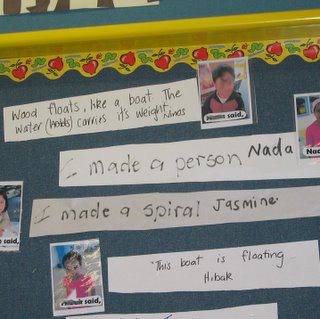Monday, February 27, 2006
Tuesday, February 21, 2006
An oral language focus
 At the end of last year Gay and I visited a school in South Wellington. Brigid (class teacher) along with Angela & Warren (RTLB) have set up Discovery Time to target the oral language needs of their year 1 & 2 students.
At the end of last year Gay and I visited a school in South Wellington. Brigid (class teacher) along with Angela & Warren (RTLB) have set up Discovery Time to target the oral language needs of their year 1 & 2 students.
During the session, when teachers heard good examples of oral language, they wrote down what was said. This was then displayed on the wall next to the student's name and photo. At the end of the session these 'good talking' quotes were shared with the class. This was a highlight of the reflection time and very much enjoyed by the children.
 At the end of last year Gay and I visited a school in South Wellington. Brigid (class teacher) along with Angela & Warren (RTLB) have set up Discovery Time to target the oral language needs of their year 1 & 2 students.
At the end of last year Gay and I visited a school in South Wellington. Brigid (class teacher) along with Angela & Warren (RTLB) have set up Discovery Time to target the oral language needs of their year 1 & 2 students.During the session, when teachers heard good examples of oral language, they wrote down what was said. This was then displayed on the wall next to the student's name and photo. At the end of the session these 'good talking' quotes were shared with the class. This was a highlight of the reflection time and very much enjoyed by the children.
Sunday, February 12, 2006
What is Discovery Time?
Discovery Time is a ninety minute, action packed, activity based programme similar to the 'Developmental' or 'Choosing Time' concept of the 1970's. Held once a week, it provides opportunities for teachers to meet the cognitive, social-emotional and physical needs of students through well planned, structured, activity based experiences.
It began two years ago as a collaborative project between the Junior Syndicate at Porirua East School and Resource Teachers: Learning & Behaviour (RTLB). Since then the concept has continued to grow and develop. It is now used in over thirty classrooms in the greater Wellington area (please add a comment if you have set it up in other parts of New Zealand, we'd love to hear from you).
It was initially designed to meet the needs of students who found the structured academic focus of junior classrooms a challenge. It soon became apparent that there were benefits for all students and for teachers as well. The programme is based on three key principles:
- That students need opportunities not only for cognitive development, but also for social-emotional and physical development.
- That students need to be actively involved in 'hands on' experiential learning.
- That student directed learning increases motivation and success.
During Discovery Time, the children; experiment, problem solve, challenge themselves, practise new skills, explore new ideas, think creatively... the list is endless. At the end of the session they reflect on their experiences and share what they have learned.
For teachers, it's a time to step back from the 'teacher' role and become the facilitator, the questioner, the encourager, the helper...
Discovery Time is one of the highlights of the school week.
Subscribe to:
Comments (Atom)